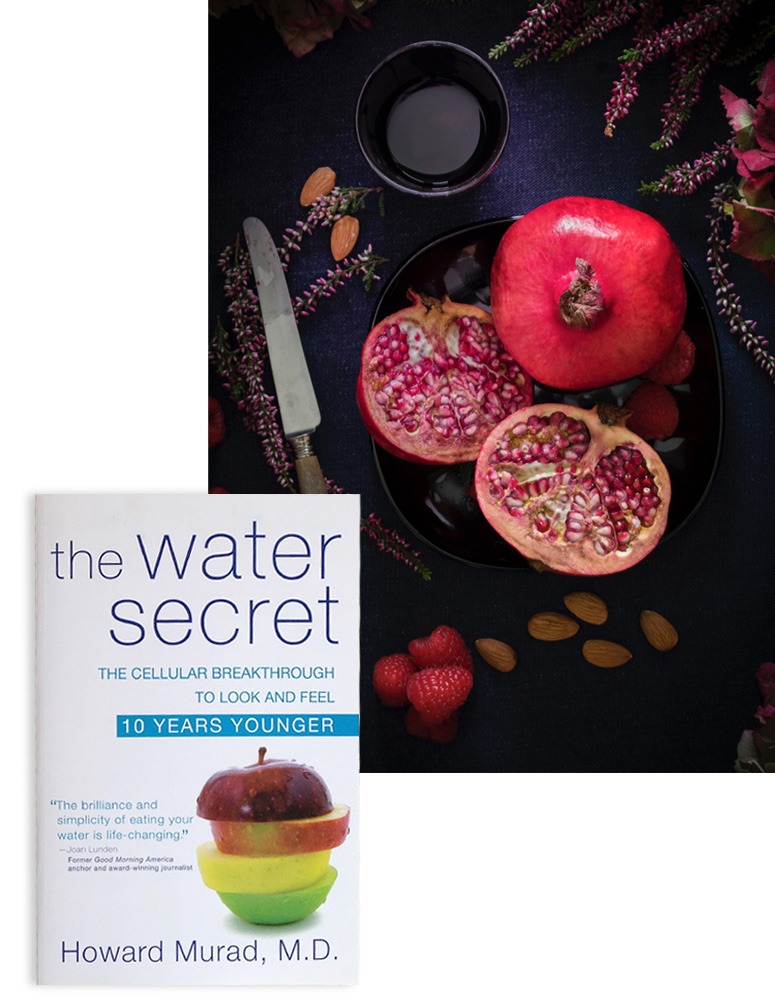Eating Your Way to Younger Skin!
Friends, followers—and of course, patients—have heard me say many times that “Skin is the window to wellness!” As “the Father of Internal Skincare,” it has been my longstanding belief that healthy skin is nourished from the inside-out—which means it’s dependent as much, or more, on diet as on skincare products.
A growing body of research provides independent, third-party confirmation of the impact diet can make—not just on skin conditions from acne to psoriasis to rosacea to wrinkles, but also on the other illnesses associated with some of these conditions. A recent article in The Dermatologist, for example, summarizes current epidemiologic studies on the impact of diet on various skin conditions.
Three of the major factors that contribute to aging skin are oxidation, inflammation, and glycation. These factors interact and reinforce each other. For example, exposure to UV radiation leads to the generation of free radicals (oxidation), which triggers inflammatory processes, which further age the skin. The process of glycation—in which excess sugar in the blood binds to proteins—weakens the skin’s collagen framework, contributing to loss of elasticity and wrinkling.
My own research demonstrates the beneficial effects that a healthy diet can have on preventing wrinkles, sagging skin, photo-damage, and other signs of aging.
For example, pomegranates and other foods increase the effectiveness of sunscreen—and, indeed, act as a natural sunscreen even without a topical barrier. My research, reported in Nutrient Insider and other publications, demonstrated that adding “pomegranate extract topically boosted the SPF of the sunscreen formula by 20%. But you can improve the SPF even more if you take the pomegranate extract orally. That will add another 25% improvement in the SPF.” In other words, you can eat your sunscreen!
Another way to slow the aging of your skin is by increasing your consumption of foods rich in antioxidants. These include fruits, vegetables, whole grains, and certain spices and herbs. Faithful readers know that my favorite antioxidant-containing foods include pomegranates, blueberries, cranberries, Goji berries, green tea, and of course, chocolate!
Antioxidants also combat inflammation, another cause of aging skin. Besides the antioxidant-rich foods mentioned above, other anti-inflammatory foods include those rich in Omega-3 fatty acids, such as cold water fish like salmon, tuna, herring, and mackerel; fish oil and flaxseed oil; walnuts and chia seeds; organic broccoli, Brussels sprouts, cauliflower, and spinach; and soybeans and tofu.
Carotenoids are another class of nutrients that serve to protect cells from the dangers of oxidation. Foods rich in carotenoids include Goji berries, tomatoes, pink grapefruit, and watermelon.
Finally, Vitamin C is responsible for producing collagen, which helps skin look plumper and younger. Foods rich in vitamin C include citrus fruits, mangos, strawberries, kale, kiwi, spinach, and peppers, including chili peppers.
Glycation, the third factor in aging skin, is a result of excess blood glucose levels. In glycation, glucose binds to proteins, which impacts collagen and leads to a loss of skin elasticity. This process is further accelerated in areas of the body exposed to UV radiation. The bottom line is to limit your intake of sugar, which is ubiquitous in processed foods, including refined grains. Most fruits are also high in sugar, but contain phytonutrients and other health benefits. So, be mindful of your fruit consumption, particularly of fruit juices—which concentrate the sugar through removal of the fiber—as well as your consumption of other sugars. Make your chocolate dark—70% or more cacao. And eat your veggies, legumes, and olive oil—all of which contain phytonutrients shown to limit photo-damage and reduce aging of the skin.
For more information on eating your way to youthful skin—and a healthy body overall, read my book, The Water Secret: The Cellular Breakthrough to Look and Feel 10 Years Younger.
DISCLAIMER: The information provided on this site is intended for your general knowledge only and is not a substitute for professional medical advice or treatment for specific medical conditions. You should not use this information to diagnose or treat a health problem or disease without consulting with a qualified healthcare provider, who should also be consulted with any questions or concerns you may have regarding your condition.
